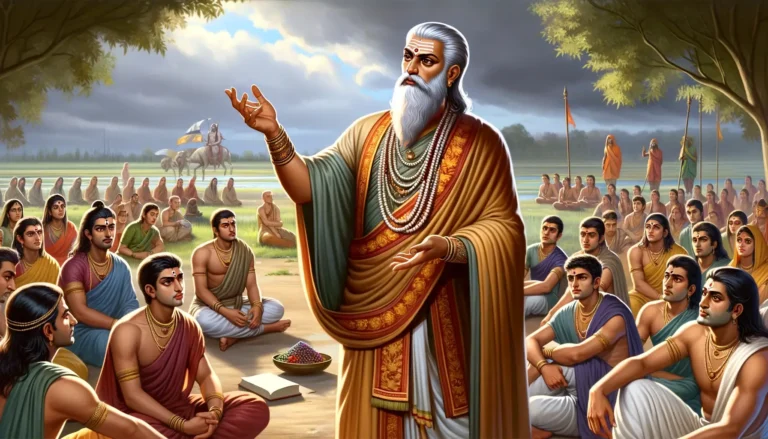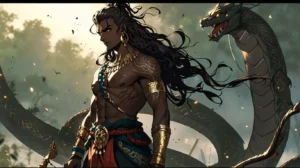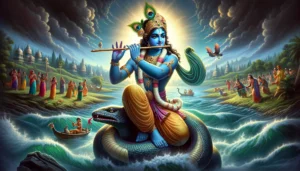The Mahabharata, one of the great epics of Indian mythology, holds a paramount place in Indian culture and literature. This sprawling narrative, rich with complex characters and intricate plot lines, serves not just as a story but as a repository of ancient wisdom and moral guidance. Among its diverse cast, Dronacharya emerges as a central figure whose life and teachings leave an indelible mark on the epic’s trajectory. As a revered guru, unmatched archer, and strategic mastermind, Dronacharya’s role transcends that of a mere character, embodying themes of duty, loyalty, and the nuanced dance of dharma.
Early Life and Quest for Knowledge
Birth and Early Years: Dronacharya’s origins are marked by humility and an unquenchable thirst for knowledge. Born to a sage in a simple setting, his early years were shaped by austerity, driving him to seek wisdom and mastery over martial arts.
Gurukul with Parashurama:
Drona’s quest led him to the feet of Parashurama, an avatar of Vishnu known for his prowess in warfare and weaponry. Under Parashurama’s tutelage, Drona mastered divine weaponry, including the use of the Brahmastra, and principles of war strategy, setting the stage for his future as a legendary guru.
Training the Pandavas and Kauravas:
Dronacharya’s legacy is perhaps most evident in his role as the martial teacher of the Pandavas and Kauravas. His teaching was marked by impartiality, yet he strategically utilized his students to fulfill his vow of revenge against Drupad.
The Bond with Drupad:
The narrative of Dronacharya, intertwined with King Drupad, ruler of Panchala, unfolds a story marked by friendship, betrayal, and the ensuing cycle of revenge, casting a long shadow over the saga of the Mahabharata. Initially friends in their youth, the breach between Drona and Drupad set the stage for a dramatic sequence of events fueled by rivalry and the quest for vengeance.
Dronacharya and Drupad’s friendship soured due to Drupad’s arrogance and a misunderstanding. Drupad, after ascending to the throne, demeaned Drona, who was then seeking assistance. This led Drona to vow revenge. He later became the martial teacher of the Pandavas and Kauravas, leveraging this position to settle his score with Drupad. He instructed his pupils to defeat Drupad, capturing him as a part of their education. This act was but the beginning of a long-standing enmity.
The animosity escalated when Drona, after his students successfully captured Drupad, humiliated the king but spared his life, taking half of his kingdom. This humiliation planted the seeds of vengeance in Drupad’s heart, compelling him to perform a sacrifice to beget progeny capable of defeating Drona.
This led to the birth of Draupadi and Drishtadyumna, the latter destined to fulfill his father’s wish for revenge.
The culmination of this rivalry was witnessed on the battlefield of Kurukshetra, where Dronacharya, aligning with the Kauravas, met his fate at the hands of Drishtadyumna. Utilizing a clever stratagem suggested by Lord Krishna, the Pandavas deceived Drona into believing his son Ashwatthama had fallen in battle. Overwhelmed by grief and misled by a half-truth from Yudhishthira, Drona laid down his weapons, leading to his demise by Drishtadyumna’s hands, thus completing the cycle of retribution and underscoring the profound themes of duty, deception, and destiny that permeate the Mahabharata
The Kurukshetra War
Dronacharya’s Dilemma: The Kurukshetra War presented Drona with profound moral and ethical dilemmas. Torn between his duty as a commander of the Kaurava forces and his love for his students, his role in the war exemplifies the epic’s exploration of dharma and the complexities of adhering to one’s duty.
The Fall of a Warrior: Drona’s death, orchestrated by Krishna and executed by Dhrishtadyumna, marked a pivotal moment in the war. The strategy to deceive Drona about his son Ashwatthama’s death illustrates the lengths to which the Pandavas and their allies went to neutralize threats, reflecting on the themes of war, strategy, and the blurring lines between righteousness and necessity.
Legacy
The Moral Complexity: Dronacharya’s life story is a profound exploration of the moral and ethical complexities that define human nature. His story raises questions about loyalty, duty, and the consequences of revenge, offering no easy answers but rather reflecting the intricate tapestry of human emotions and dharma.
Dronacharya’s Legacy: Dronacharya’s impact on the Mahabharata and the lessons his story offers are timeless. Through his life, the epic addresses the complexities of mentorship, the cycles of revenge, and the enduring quest for honor and duty amidst the shifts of fate
Also read
Ashwatthama: The Eternal Warrior of the Mahabharata
Maharathi Karna: The Heroic Figure of Tragedy in the Mahabharata
Who was Dronacharya?
A central figure in the Mahabharata, revered for his profound knowledge, archery prowess, and strategic acumen, serving as the influential guru to the Pandavas and Kauravas.
What characterizes the relationship between Dronacharya and Drupad?
Their relationship transitions from friendship to deep-seated enmity, underscoring themes of betrayal, revenge, and the karmic repercussions of their actions
How did Dronacharya died?
Dronacharya’s death in the Kurukshetra War was influenced by Krishna’s advice. To disarm Dronacharya, who was a formidable opponent on the battlefield. They spread the false news that Dronacharya’s beloved son, Ashwatthama, had been killed in the battle.
Yudhishthira, known for his truthfulness, was chosen to convey this misinformation because Dronacharya would believe him. However, Yudhishthira’s statement was crafted to be misleading. He announced that “Ashwatthama is dead,” but added quietly “the elephant,” referring to an elephant named Ashwatthama that had indeed been killed. Dronacharya, only hearing the first part and trusting Yudhishthira’s word, thought his son had died.
Overcome with grief and despair, believing his son was dead, Dronacharya lost his will to fight. He laid down his weapons and sat down on the battlefield in a state of deep meditation and vulnerability. Seizing this moment, Drishtadyumna, who had been born specifically to kill Dronacharya as per a divine prophecy, approached him and beheaded him, thus fulfilling the prophecy and avenging his father Drupad’s enmity with Dronacharya.


